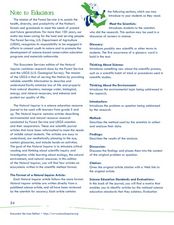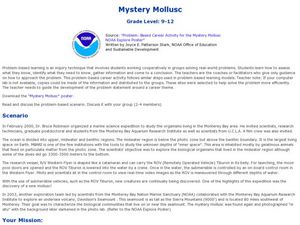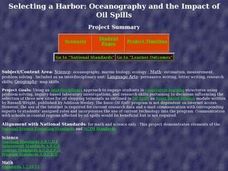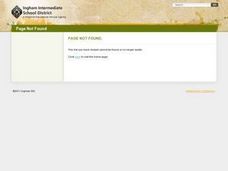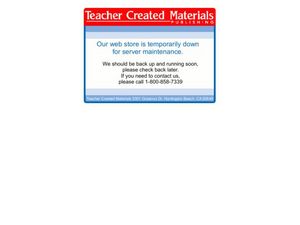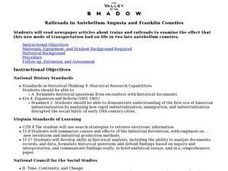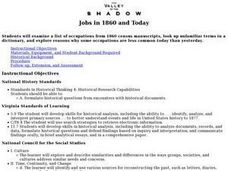Curated OER
The Origin of Life: Alternative Views
Students explore the topics of faith and science as they relate to the origins of life. They consider the major points of Darwin's Theory of Evolution and brainstorm various explanations of how life began. Students investigate different...
Los Angeles Unified School District
River Systems
Scholars must react to the ecosystems of a river. They use inquiry-based learning along with maps and visuals to better understand the impact of rivers on everyday life. To finish, they create final written projects and presentations.
Curated OER
Call to Arms: Robotic Analogues for Human Structures
Investigate deep sea discovery through the emerging technology being built. In this physical science lesson, students analyze the different types of motion available in the human arm. Students research educational websites...
EngageNY
TASC Transition Curriculum: Workshop 15
What do a cheetah, Audi commercial, and air have in common? They're all topics of an engaging inquiry-based, hands-on workshop for educators about background knowledge, reading strategies, the CER model, and argumentative writing. The...
Curated OER
Boston Harbor Cruise: A Shoreline Survey
The students take a harbor cruise, photograph, and draw shore line features attending to evidence of human impact/consequences, and its cost on marine/land animal habitats vegetation, weather patterns, signs of erosion, and the water...
Curated OER
Hero Or Zero?
Learners investigate science and technology by reading a children's book. In this reading comprehension lesson, students read the story Archibald Frisby and discuss the ways we use science and technology in everyday life....
Curated OER
Natural Inquirer Ecosystem Article Lesson
Young scholars discover new ways to preserve the ecosystem by completing graphic organizers. In this environmental lesson, students read an article from the Natural Inquirer in small groups and fill out a graphic organizer based on...
Curated OER
Inference By Analogy
Students infer the use or meaning of items recovered from a North Carolina Native American site based on 17th-century European settlers' accounts and illustration.
PBS
Predicting/Making a Hypothesis
As an introduction to the hypothesis and testing method of investigation, young history detectives engage in a special investigation of a family artifact. After watching a short video that demonstrates the method, they develop a...
Curated OER
Death On Board La Belle: Finding Clues from Old Bones
Students practice analyzing skeletal remains for clues by using the Internet. In this scientific investigation lesson, students research the La Belle shipwreck using the Internet and written materials, later completing a Skeletal...
Curated OER
Mystery Mollusc
Students investigate the different regions of our oceans by researching the Internet. In this oceanography instructional activity, students discover the different jobs related to ocean research and examine their roles by reading...
Curated OER
Journey of the Salmon
Third graders predict salmon migration routes and explore how dams affect the salmon migration. They explore the cultural significance of salmon to the Nez Perce people and design technology to aid salmon migration.
Curated OER
Selecting a Harbor: Oceanography and the Impact of Oil Spills
Students work together to determine a new site for a harbor. Using the Internet, they research the impact of an oil spill on the oceans and wildlife. They present their findings to the class and a solution to the problem.
Curated OER
Valley of the Butterflies
First graders explore why butterfly populations in Idaho's Lapwai Valley have decreased.
Curated OER
Gwynns Falls
Students investigate the question: What is the impact of urban development and expansion on the health of a decidious forest ecosystem and humans? They examine the issue of land development by responding to a specific scenario and...
Curated OER
Identity Box
Students examine how the work (paid or voluntary) they do in the past, present, and future affects and is affected by the communities to which they belong. They realize that human beings' perceptions of one another based on age, sex,...
Curated OER
Presidential Trading Cards
Learners research the Internet to collect data about the US Presidents. They use the data that they collect along with available technology to produce trading cards and brochures using keyboarding skills, text boxes, acquiring photos,...
Curated OER
An Encyclo-ME-dia for Every Child
Learners create a digital scrapbook that shows information-text and pictures that are specific to each child. They make charts and graphs. They use digital cameras, scanners, software, to write captions, stories, poems, letters, and...
Curated OER
Gathering, Traditions, and Nutrition of Our Food
Students gain a better understanding of what it means to eat seasonally through learning about traditional hunting, gathering, and food preparation methods of Athabascan tribes. By interacting with Native American Elders and...
Benjamin Franklin Tercentenary
Guess What Benjamin Franklin Did!
Students research Ben Franklin's inventions. In this invention lesson, students see the relationship between a need and an invention. Students will engage in a class discussion, read a handout, and play a match the invention to its...
Curated OER
Thanks Be To You
Learners research U.S. history by completing a worksheet activity in class. In this historical figure lesson, students identify the contributions and risks taken by the former African-American leader Martin Luther King Jr. Learners read...
Curated OER
Winter Survival
Students study the Lewis and Clark expedition and work in small groups to solve problems that the explorers might have encountered.
Curated OER
Railroads in Antebellum Augusta and Franklin Counties
Eleventh graders are divided up into groups and work on separate worksheets. They reassemble as a class and discuss the different articles and how the railroads affected people's lives.
Curated OER
Jobs in 1860 and Today
Students compare occupations during the 19th century with the 21st century using information from 19th century census information.






